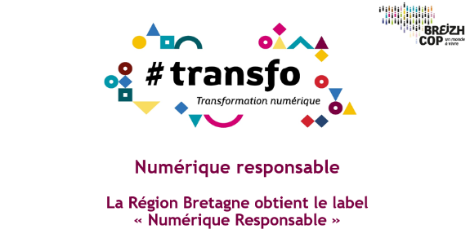Brittany at the cutting edge of digital sobriety
March 2025
Réseau pour la transition énergétique (CLER)
In February 2020, the Brittany Region adopted a roadmap in favour of responsible digital strategies, enabling it to become the first region in France to be awarded the ‘Responsible Digital’ label. In addition to inclusive digital development and the promotion of local public services, the Region has invested in digital services and sustainable IT equipment. Five years on, what lessons can be learned in terms of frugality?
To download : s-inspirer-bretagne-sobriete-numerique.pdf (180 KiB)
The project
The roll-out of the responsible digital strategy in Brittany is part of the Breizh COP, an initiative to mobilise stakeholders in Brittany launched in 2017 in response to the climate and environmental emergency, and inspired by the model of international COPs. The Breizh COP identified digital technology as one of the issues to be addressed by the local authority, which led to the hiring of a dedicated digital officer and the award of the ‘Responsible Digital’ label by the Institut du Numérique Responsable (INR) in 2021, following an audit and the Region’s commitment to a multi-year action plan.

Working on equipment
One of the main components of the regional action plan is to adopt a policy of restraint in new equipment. The Region has thus identified criteria to determine whether the equipment to be purchased is compatible with the responsible digital strategy, particularly in terms of power consumption or materials used. The local authority also ensures that the legal requirement of 20% of IT equipment being reused is met. One of the difficulties in exceeding this percentage is that a technically heterogeneous computer pool, i.e. with many different references, is too complex to manage in terms of maintenance and cybersecurity. In the absence of a mature market capable of delivering thousands of reused computer workstations with the same characteristics, the Region therefore favours internal reuse and support for the Breton reuse sector. Alongside many other local authorities in the region, it donates 100% of its computer equipment, particularly that of secondary schools, to Ordi Grand Ouest, an association funded to recondition the equipment for reuse by the social and solidarity economy sector.
Deploying sobriety of use
The ambition to purchase more sober equipment is thwarted by the lack of spare parts, the lack of transparency in the environmental data provided by manufacturers, but also by the rapid obsolescence of terminals caused by increasingly demanding software updates. This does not prevent the Region from acting on sobriety of use. It has introduced automatic shutdown of the 50,000 regional computer workstations at weekends (administration and secondary schools) and raises awareness of the adoption of simple eco-friendly gestures such as switching off computers at the end of the day. The new printing strategy has led to a profound change in the practices of staff. Badge printing allows them to monitor their consumption and display the carbon cost of a printout. Thanks to the default setting for more economical printing, the Region has also succeeded in achieving a steady reduction in the number of annual print-outs.
Assessment of the footprint as a prerequisite
Obtaining the ‘Responsible Digital’ label makes it possible to operationalise the transformations to be accomplished within one’s organisation by relying on the reference framework produced by the INR. One of the prerequisites is to assess the environmental footprint of its digital activity in order to better target the actions to be taken. Thus, the Region carries out an annual digital greenhouse gas emissions assessment (BEGES) to evaluate the implementation of its action plan. It has internalised this approach by training more than ten agents. The exercise reveals a major challenge in terms of equipment management: what cannot be accounted for by the BEGES reflects a difficulty in correctly cataloguing its equipment and ultimately controlling its impact. Thus, nearly 30% of the BEGES is not reliable, in particular the impact of small digital devices or data centres not directly managed by the Region.
Obstacles to environmental clauses
Controlling the environmental impact of equipment requires the introduction of appropriate environmental clauses in public procurement. However, the European legal framework, which is robust in terms of ecodesign and environmental traceability, is inoperative for the majority of non-European manufacturers. This makes it difficult to extend the lifespan of equipment. Furthermore, in the face of growing cybersecurity requirements, the Region must use service providers for data centres. However, these rarely communicate the environmental characteristics of their offer and sometimes use transnational firms themselves, which makes it difficult to locate the outsourced servers. Fortunately, the Region’s work on the eco-design clauses for its digital services is proving more successful: the platforms mes-services.bzh and mon-compte.bzh have obtained an ecoscore of 82/100 from a specialised certification office.
The involvement of the territorial ecosystem
Since January 2025, an employee of the ADN Ouest association, a network of digital professionals in the Greater West of France, has been supporting the transition of the private sector towards responsible digital technology thanks to ADEME’s Alt IMPACT programme. Internally, the Region continues to train its agents thanks to the Fresque du Numérique and has updated its IT charter to integrate responsible digital technology. The work on digital sobriety, a pioneer in 2020, is still in the emerging phase and still requires continuous investment from public actors to materialise on a large scale.